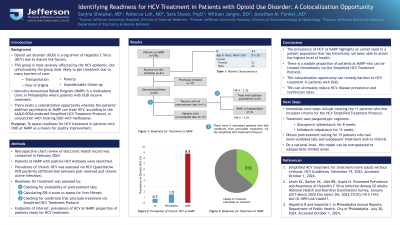Sunday Poster Session
Category: Liver
P1169 - Identifying Readiness for HCV Treatment in Patients With Opioid Use Disorder: A Colocalization Opportunity
Sunday, October 27, 2024
3:30 PM - 7:00 PM ET
Location: Exhibit Hall E

Has Audio

Sanjna Shelukar, MD
Thomas Jefferson University Hospital
Philadelphia, PA
Presenting Author(s)
Sanjna Shelukar, MD, Rebecca Loh, MD, William Jangro, DO, Sara Shane, , Jonathan M. Fenkel, MD
Thomas Jefferson University Hospital, Philadelphia, PA
Introduction: Opioid use disorder (OUD) is a major driver of Hepatitis C Virus (HCV). Patients with OUD are the group most severely affected by the HCV epidemic, but unfortunately the group least likely to receive curative treatment due to barriers of care. There exists a colocalization opportunity whereby addiction psychiatrists, who treat patients with OUD using medication-assisted treatment, can also treat HCV. Treatment from non-HCV expert providers is done using the AASLD/IDSA-endorsed Simplified HCV Treatment Protocol. In this quality improvement project, we sought to assess the prevalence of HCV and readiness for treatment at an outpatient methadone treatment clinic.
Methods: A retrospective chart review of electronic health records at the clinic was conducted. Patients with a positive HCV antibody were identified. Prevalence of HCV was assessed by checking HCV PCR to differentiate between past resolved infection and active infection. Readiness for treatment was assessed in patients with active infection by checking for availability of pretreatment labs within the past six months, calculating a FIB-4 score, and checking for medical conditions that preclude treatment via the Simplified HCV Treatment Protocol.
Results: Of the total 296 OUD treatment clinic patients, 43 patients (14.5%) had a positive HCV antibody. Of those, 17 patients had been previously treated and were non-viremic. The prevalence of chronic HCV was 8.8% (n=26). Among these 26 untreated patients, 11 patients had timely pretreatment labs and 8 of the 11 patients had calculated FIB-4 scores < 3.25. No patients had medical conditions that precluded treatment via the Simplified HCV Treatment Protocol. Overall, 31% (n=8) of actively-infected HCV patients with OUD were ready for treatment using the Simplified HCV Treatment Protocol.
Discussion: HCV prevalence at the studied methadone treatment clinic is nearly 10 times higher than the US prevalence, highlighting this health disparity in the OUD patient population. Among patients with chronic treatment-naïve HCV at this clinic, nearly 1 in 3 were ready for treatment with addiction psychiatry using the Simplified HCV Treatment Protocol. This is a sizable proportion of patients who can be treated immediately, underscoring an unmet need and addressing the importance of colocalized care to remedy this health disparity and increase equity in HCV treatment access.
Disclosures:
Sanjna Shelukar, MD, Rebecca Loh, MD, William Jangro, DO, Sara Shane, , Jonathan M. Fenkel, MD. P1169 - Identifying Readiness for HCV Treatment in Patients With Opioid Use Disorder: A Colocalization Opportunity, ACG 2024 Annual Scientific Meeting Abstracts. Philadelphia, PA: American College of Gastroenterology.
Thomas Jefferson University Hospital, Philadelphia, PA
Introduction: Opioid use disorder (OUD) is a major driver of Hepatitis C Virus (HCV). Patients with OUD are the group most severely affected by the HCV epidemic, but unfortunately the group least likely to receive curative treatment due to barriers of care. There exists a colocalization opportunity whereby addiction psychiatrists, who treat patients with OUD using medication-assisted treatment, can also treat HCV. Treatment from non-HCV expert providers is done using the AASLD/IDSA-endorsed Simplified HCV Treatment Protocol. In this quality improvement project, we sought to assess the prevalence of HCV and readiness for treatment at an outpatient methadone treatment clinic.
Methods: A retrospective chart review of electronic health records at the clinic was conducted. Patients with a positive HCV antibody were identified. Prevalence of HCV was assessed by checking HCV PCR to differentiate between past resolved infection and active infection. Readiness for treatment was assessed in patients with active infection by checking for availability of pretreatment labs within the past six months, calculating a FIB-4 score, and checking for medical conditions that preclude treatment via the Simplified HCV Treatment Protocol.
Results: Of the total 296 OUD treatment clinic patients, 43 patients (14.5%) had a positive HCV antibody. Of those, 17 patients had been previously treated and were non-viremic. The prevalence of chronic HCV was 8.8% (n=26). Among these 26 untreated patients, 11 patients had timely pretreatment labs and 8 of the 11 patients had calculated FIB-4 scores < 3.25. No patients had medical conditions that precluded treatment via the Simplified HCV Treatment Protocol. Overall, 31% (n=8) of actively-infected HCV patients with OUD were ready for treatment using the Simplified HCV Treatment Protocol.
Discussion: HCV prevalence at the studied methadone treatment clinic is nearly 10 times higher than the US prevalence, highlighting this health disparity in the OUD patient population. Among patients with chronic treatment-naïve HCV at this clinic, nearly 1 in 3 were ready for treatment with addiction psychiatry using the Simplified HCV Treatment Protocol. This is a sizable proportion of patients who can be treated immediately, underscoring an unmet need and addressing the importance of colocalized care to remedy this health disparity and increase equity in HCV treatment access.
Disclosures:
Sanjna Shelukar indicated no relevant financial relationships.
Rebecca Loh indicated no relevant financial relationships.
William Jangro indicated no relevant financial relationships.
Sara Shane indicated no relevant financial relationships.
Jonathan Fenkel: Abbvie – Grant/Research Support. Alexion – Grant/Research Support. Gilead – Grant/Research Support. Ipsen – Grant/Research Support.
Sanjna Shelukar, MD, Rebecca Loh, MD, William Jangro, DO, Sara Shane, , Jonathan M. Fenkel, MD. P1169 - Identifying Readiness for HCV Treatment in Patients With Opioid Use Disorder: A Colocalization Opportunity, ACG 2024 Annual Scientific Meeting Abstracts. Philadelphia, PA: American College of Gastroenterology.

